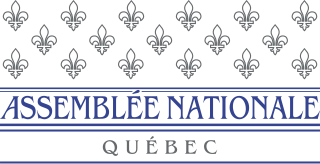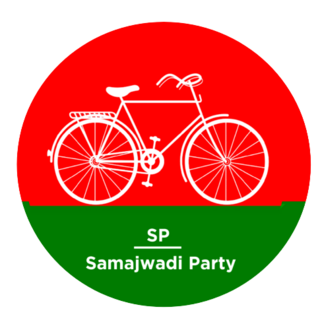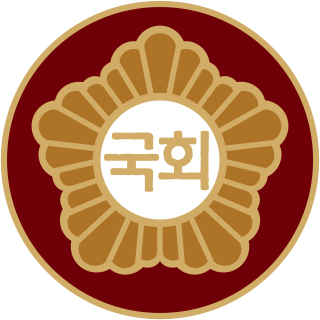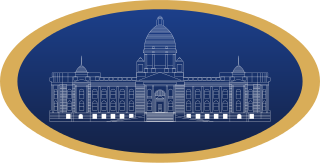Related Research Articles
A member of parliament (MP) is the representative in parliament of the people who live in their electoral district. Members of parliament typically form parliamentary groups, sometimes called caucuses, with members of the same political party. Many countries with bicameral parliaments, this term refers only to members of the lower house since upper house members often have a different title. The terms congressman and deputy are equivalent terms used in other jurisdictions.

The president of the Republic of Korea, also known as the president of Korea, is both the head of state and head of government of the Republic of Korea. The president is directly elected by the citizens of the Republic of Korea and pledges to execute the duties of their office, chief among others "to defend the State, pursue peaceful unification of the homeland." The president leads the State Council, is the chief of the executive branch of the national government and the commander-in-chief of the Republic of Korea Armed Forces.

The World Assemblies of God Fellowship (WAGF) is a global cooperative body of over 170 Pentecostal denominations that was established on August 15, 1989. WAGF was created to provide structure so that member denominations, which previously related to each other informally, could more easily cooperate on a global basis.

The National Assembly of Quebec is the legislative body of the province of Quebec in Canada. Legislators are called MNAs. The lieutenant governor of Quebec and the National Assembly compose the Legislature of Quebec, which operates in a fashion similar to those of other Westminster-style parliamentary systems. The assembly has 125 members elected via first past the post from single-member districts.

The Samajwadi Party is a socialist political party in India. It was founded on 4 October 1992 by former Janata Dal politician Mulayam Singh Yadav and is headquartered in New Delhi. The Samajwadi Party is currently led by former Chief Minister of Uttar Pradesh, Akhilesh Yadav.

The president of Pakistan is the head of state of the Islamic Republic of Pakistan. The president is the nominal head of the executive and the supreme commander of the Pakistan Armed Forces. The presidency is a ceremonial position in Pakistan. The president is bound to act on advice of the prime minister and cabinet. Asif Ali Zardari is the current president since 10 March 2024.

The Prime Ministerof Vietnam is the head of government of Vietnam who presides over the meetings of the Government. The prime minister directs the work of government members, and may propose deputy prime ministers to the National Assembly.
A member of Provincial Parliament (MPP) is an elected member of the Legislative Assembly of the Canadian province of Ontario. Elsewhere in Canada, the titular designation "Member of Provincial Parliament" has also been used to refer to members of the Legislative Assembly of Lower Canada from 1791 to 1838, and to members of the Legislative Assembly of Quebec from 1955 to 1968.

The prime minister of Pakistan is the head of government of the Islamic Republic of Pakistan. Executive authority is vested in the prime minister and his chosen cabinet, despite the president of Pakistan serving as the nominal head of executive. The prime minister is often the leader of the party or the coalition with a majority in the lower house of the Parliament of Pakistan, the National Assembly where he serves as Leader of the House. Prime minister holds office by virtue of their ability to command the confidence of the National Assembly. The prime minister is designated as the "chief executive of the Islamic Republic".

The National Assembly of the Republic of Korea is the unicameral national legislature of South Korea. Elections to the National Assembly are held every four years. The latest legislative elections were held on 10 April 2024. The current National Assembly held its first meeting, and also began its current four year term, on 30 May 2024. The current Speaker was elected 5 June 2024. The National Assembly has 300 seats, with 253 constituency seats and 47 proportional representation seats; 30 of the PR seats are assigned an additional member system, while 17 PR seats use the parallel voting method.

The National Assembly, fully the National Assembly of the Republic of Serbia, is the unicameral legislature of Serbia. The assembly is composed of 250 deputies who are proportionally elected to four-year terms by secret ballot. The assembly elects a president (speaker) who presides over the sessions.

The National Assembly of Pakistan is the lower house of the bicameral Parliament of Pakistan, with the upper house being the Senate. As of 2023, the National Assembly has a maximum membership of 336, of which 266 are directly elected by an adult universal suffrage and a first-past-the-post system to represent their respective constituencies, while 60 are elected on reserved seats for women and religious minorities from all over the country. Members hold their seats for five years or until the house is dissolved by the President on the advice of the Prime Minister. The house convenes at the Parliament House, Red Zone, Islamabad.

The Grand National Assembly of Turkey, usually referred to simply as the TBMM or Parliament, is the unicameral Turkish legislature. It is the sole body given the legislative prerogatives by the Turkish Constitution. It was founded in Ankara on 23 April 1920 amid the National Campaign. This constitution had founded its pre-government known as 1st Executive Ministers of Turkey in May 1920. The parliament was fundamental in the efforts of Mareşal Mustafa Kemal Atatürk, 1st President of the Republic of Turkey, and his colleagues to found a new state out of the remnants of the Ottoman Empire.

The Parliament of Pakistan is the supreme legislative body of the Islamic Republic of Pakistan. It is a bicameral federal legislature, composed of the President of Pakistan and two houses: the Senate and the National Assembly. The president, as head of the legislature, has the power to summon or prorogue either house of the Parliament. The president can dissolve the National Assembly, only on the Prime Minister's advice.

During the French Revolution, the National Assembly, which existed from 17 June 1789 to 9 July 1789, was a revolutionary assembly of the Kingdom of France formed by the representatives of the Third Estate (commoners) of the Estates-General and eventually joined by some members of the First and Second Estates. Thereafter, it became a legislative body known as the National Constituent Assembly, although the shorter form was favored.

The prime minister of Cambodia is the head of government of Cambodia. The prime minister is also the chairman of the Cabinet and leads the executive branch of the Royal Government of Cambodia. The prime minister is a member of parliament, and is appointed by the monarch for a term of five years. Since 1945, 37 individuals have served as prime minister; 33 as official prime ministers, and 4 in acting capacities. The current prime minister since 2023 is Hun Manet.

The Federal Parliament of Nepal is the bicameral federal and supreme legislature of Nepal established in 2018. It consists of the National Assembly and the House of Representatives as parallel houses.

The Legislative Assembly of the National Capital Territory of Delhi, is a unicameral legislature of the union territory of Delhi in India. Delhi Legislative Assembly is the legislative arm of the Government of Delhi. At present, it consists of 70 members, directly elected from 70 constituencies. The tenure of the Legislative Assembly is five years unless dissolved sooner.

Mgcini Tshwaku is a South African politician and member of the Economic Freedom Fighters (EFF) who has served as the City of Johannesburg's Member of the Mayoral Committee (MMC) for Safety and Security since 2023. Prior to serving as Johannesburg city council, he was a Member of the Gauteng Provincial Legislature between 2014 and 2017 and a Member of the National Assembly of South Africa from 2017 until 2023.
Mncedisi Nontsele is a member of the National Assembly of South Africa. A member of the African National Congress, he was elected to parliament in 2019. Nontsele is a former mayor of the Lukhanji Local Municipality.